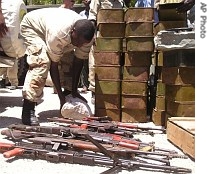-
(单词翻译:双击或拖选)
Mogadishu
03 May 2007
Businessmen in the Somali capital, Mogadishu, began handing over their weapons to the transitional government on Thursday, following an agreement by the government to protect the business community and its properties. VOA Correspondent Alisha Ryu has details from Mogadishu.
 |
| A government soldier inspects weapons handed over by members of the business community, 03 May 2007 |
A procession of cars and trucks delivered boxes of ammunition1, assault rifles, and heavy guns to Somali security officials and observers, including Ethiopian military officials and Ugandan soldiers in Somalia as part of African Union's peacekeeping force.
Somalia's new police commander Abdi Hassan Awale Qeybdid told reporters that the owners of 151 local companies have agreed to disarm2, a decision he says will help bring peace to one of the most dangerous cities in the world.
The police commander says the business leaders gave their promise to give up their weapons in writing. He says getting guns off the streets is a key goal in the government's plans to secure the capital.
Ugandan army Colonel Peter Elewelo praised what he called "the brave and positive action" of Somalia's business community. To ensure that the weapons are not used in partisan3 clan4 fighting, the colonel says his Ugandan peacekeepers will safeguard them at their barracks.
"This is the way forward," he said. "We need to get rid of these dangerous guns. They have had it for the last 16 years and it has brought nothing to them."
Government security officials tell VOA that the businessmen volunteered to give up their weapons last week, after receiving assurances that the government would implement5 tough security measures, especially in Bakara market, the biggest open air market in Somalia.
But it is widely believed that the business owners agreed to disarm largely because of fears that if they did not comply, the government would brand them as supporters of the defeated Islamic movement and attempt to confiscate6 their businesses or shut them down.
The link between Mogadishu businessmen and the Islamic courts go back more than a decade, when the first courts were established in north Mogadishu.
Through the years, the Islamists retained the support of many businessmen, because the courts provided some means of upholding law and order in a country that has had no functioning government since 1991.
Somalia's secular7 interim8 government, backed by Ethiopian troops, took power in Mogadishu in January, ending the Islamists' six-month rule over much of Somalia. Several top Islamist leaders were accused by the Somali government, Ethiopia, and the United States of sheltering al-Qaida terrorists and turning Somalia into a terrorist training ground.
There is growing fear here now that anyone who opposes the government may be labeled as an Islamist supporter or a terrorist.
The Somali government has ruled out reconciling with leaders with the Islamist movement, whom they say are behind the violent insurgency9 in the capital that has killed more than 1,000 people and caused nearly 400,000 others to flee.
 收听单词发音
收听单词发音
1
ammunition

|
|
| n.军火,弹药 | |
参考例句: |
|
|
|
2
disarm

|
|
| v.解除武装,回复平常的编制,缓和 | |
参考例句: |
|
|
|
3
partisan

|
|
| adj.党派性的;游击队的;n.游击队员;党徒 | |
参考例句: |
|
|
|
4
clan

|
|
| n.氏族,部落,宗族,家族,宗派 | |
参考例句: |
|
|
|
5
implement

|
|
| n.(pl.)工具,器具;vt.实行,实施,执行 | |
参考例句: |
|
|
|
6
confiscate

|
|
| v.没收(私人财产),把…充公 | |
参考例句: |
|
|
|
7
secular

|
|
| n.牧师,凡人;adj.世俗的,现世的,不朽的 | |
参考例句: |
|
|
|
8
interim

|
|
| adj.暂时的,临时的;n.间歇,过渡期间 | |
参考例句: |
|
|
|
9
insurgency

|
|
| n.起义;暴动;叛变 | |
参考例句: |
|
|
|















